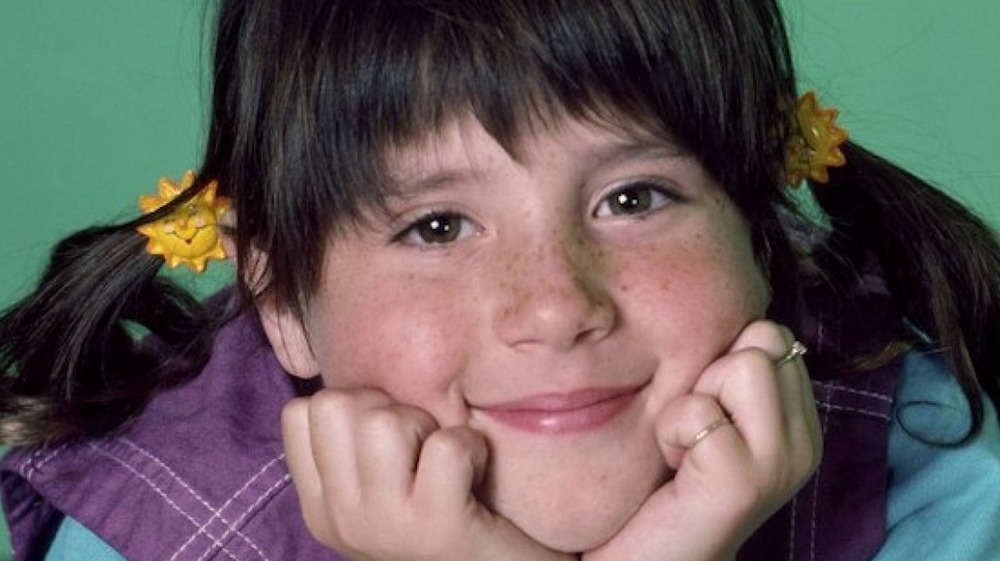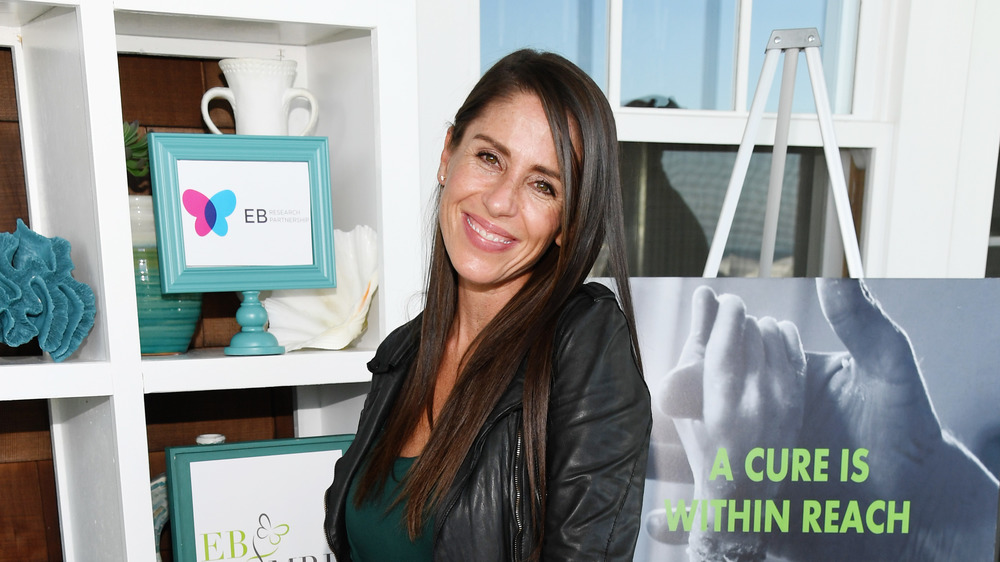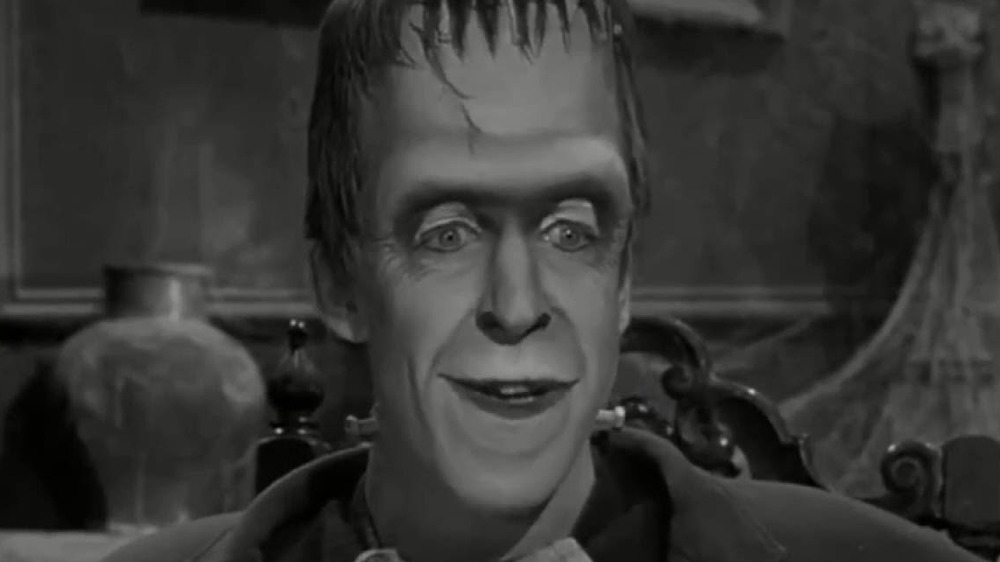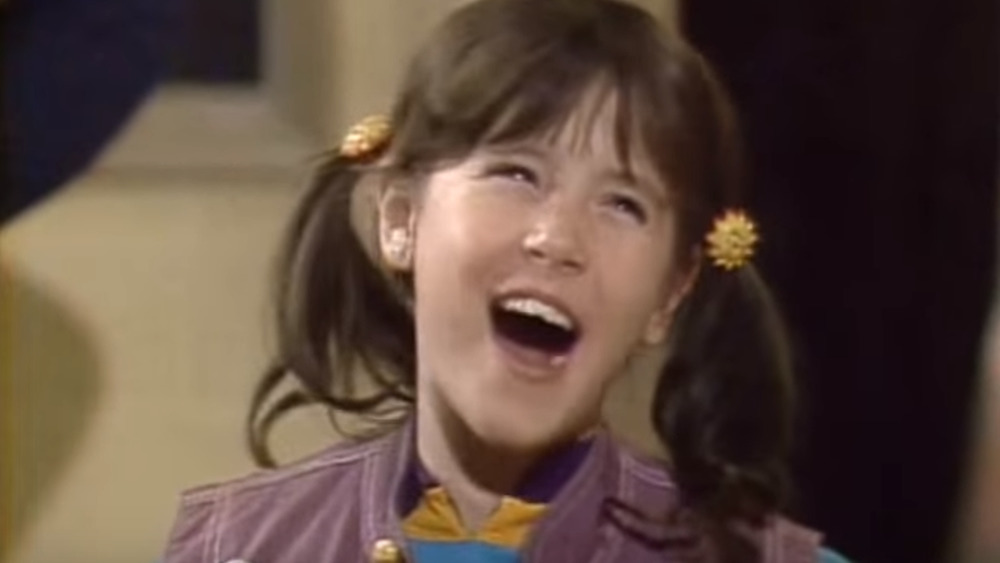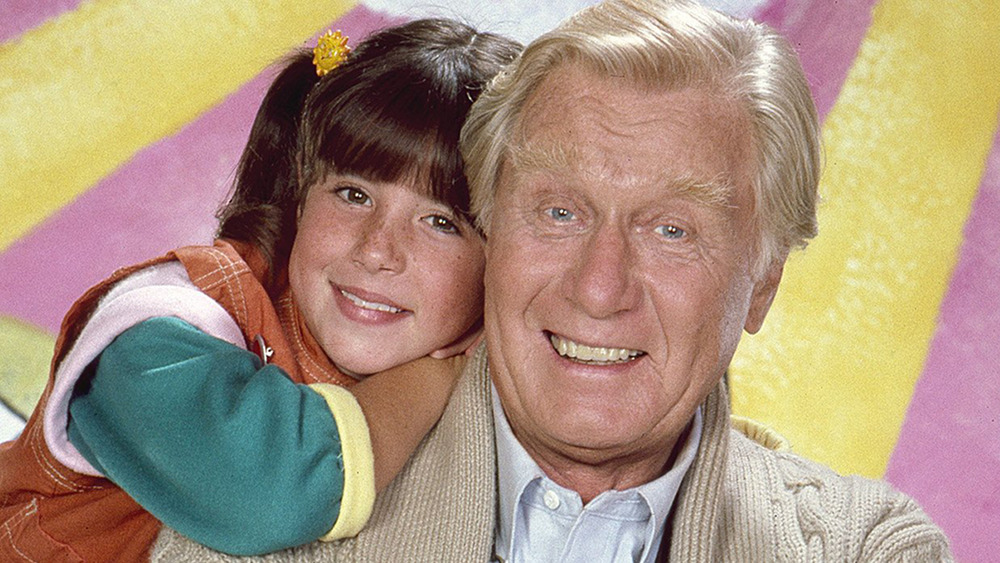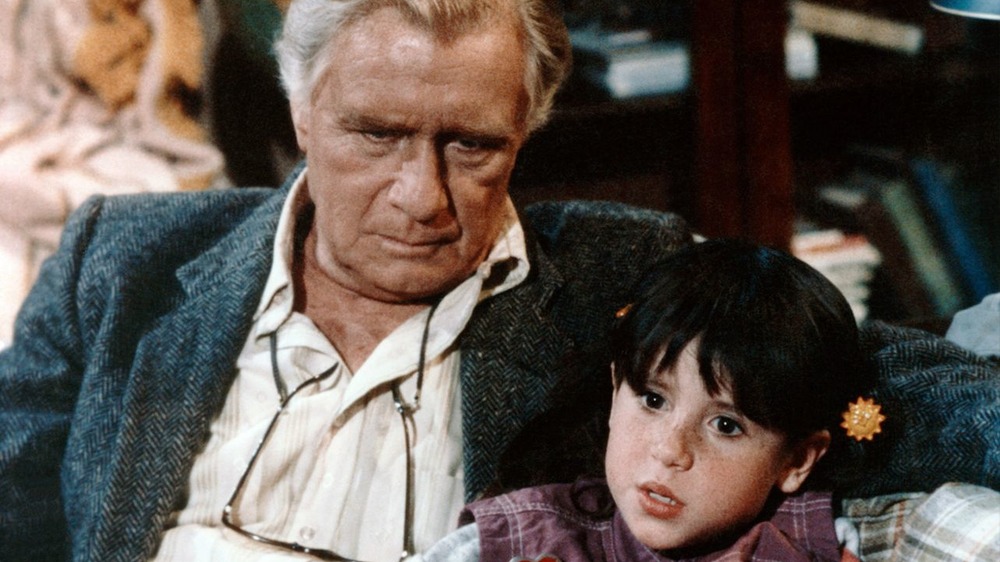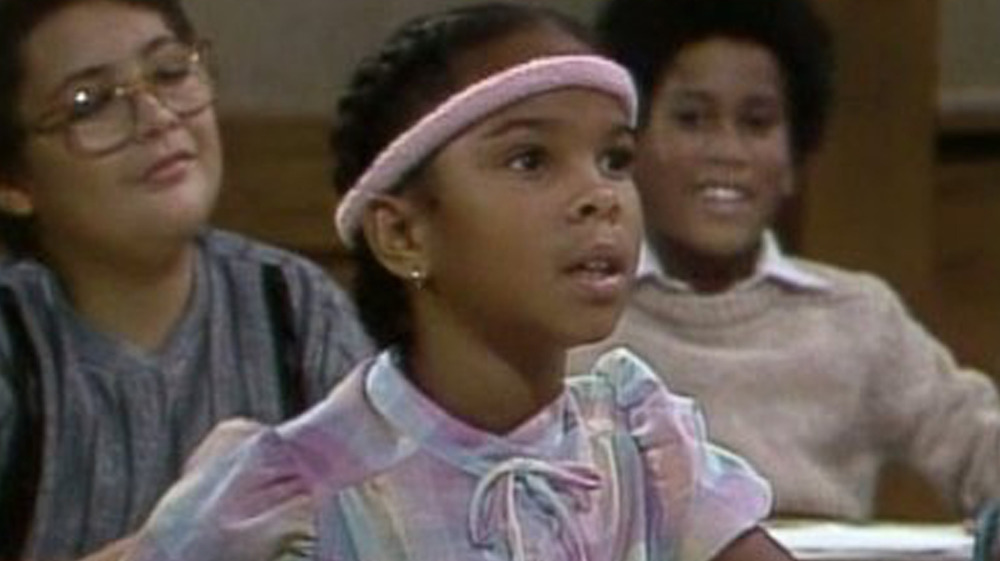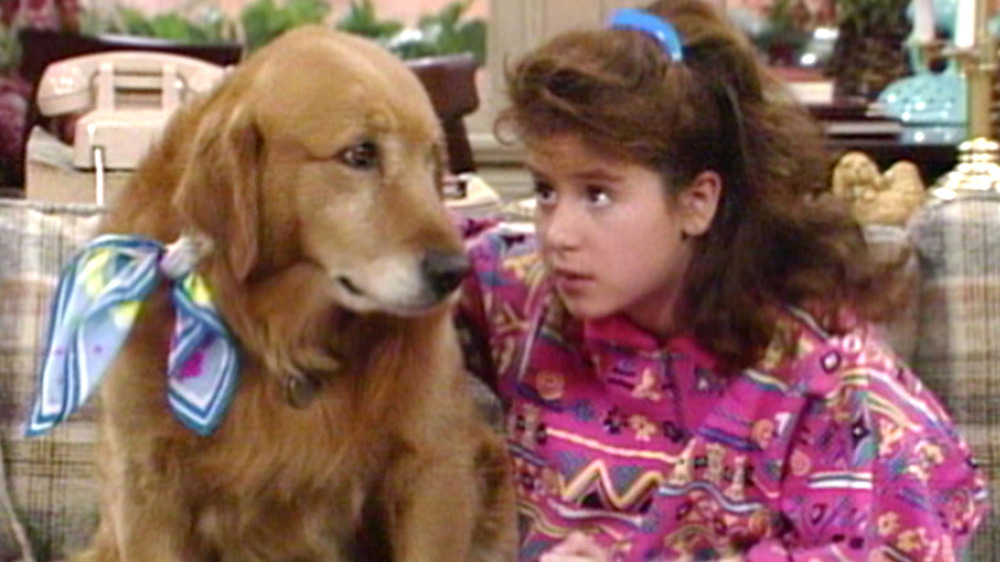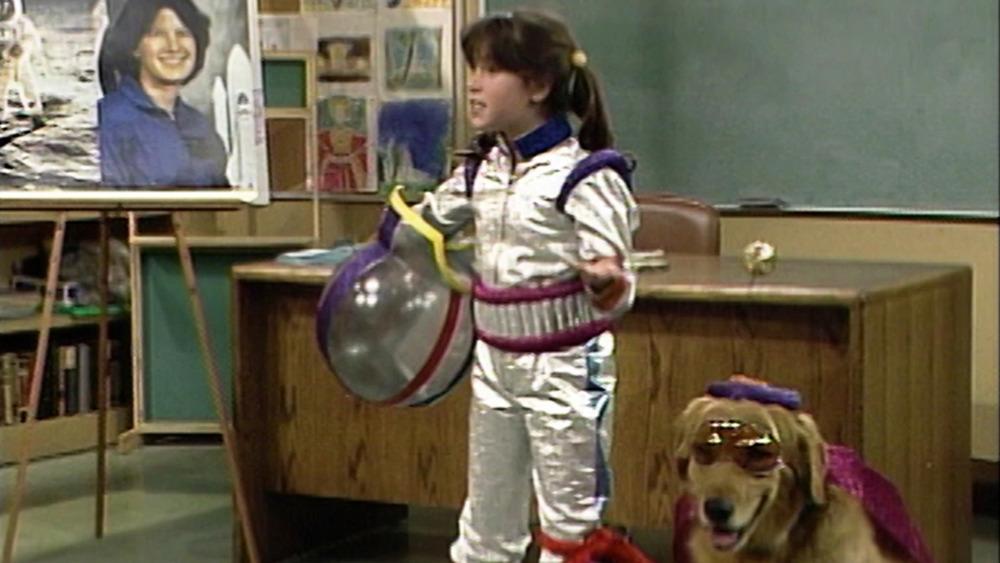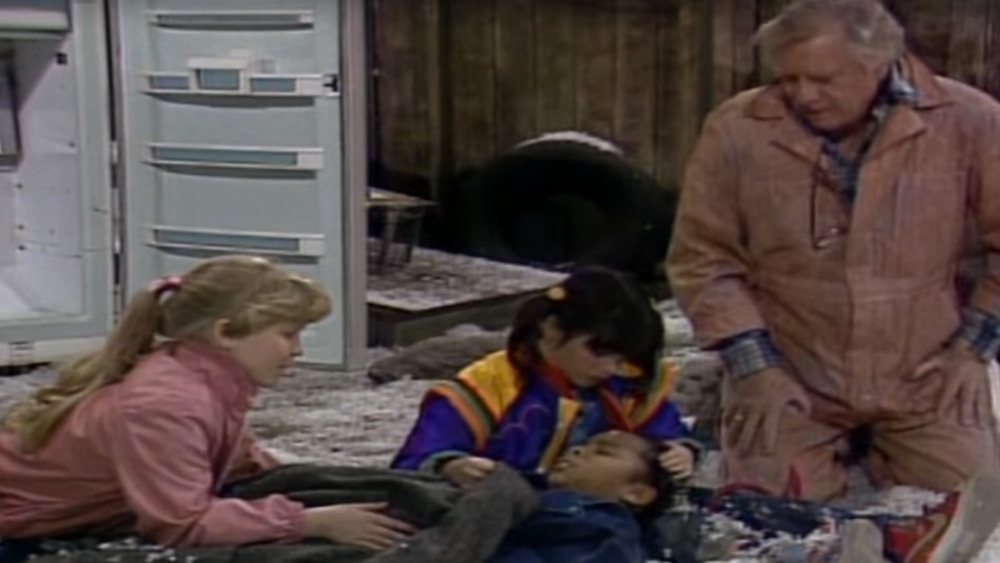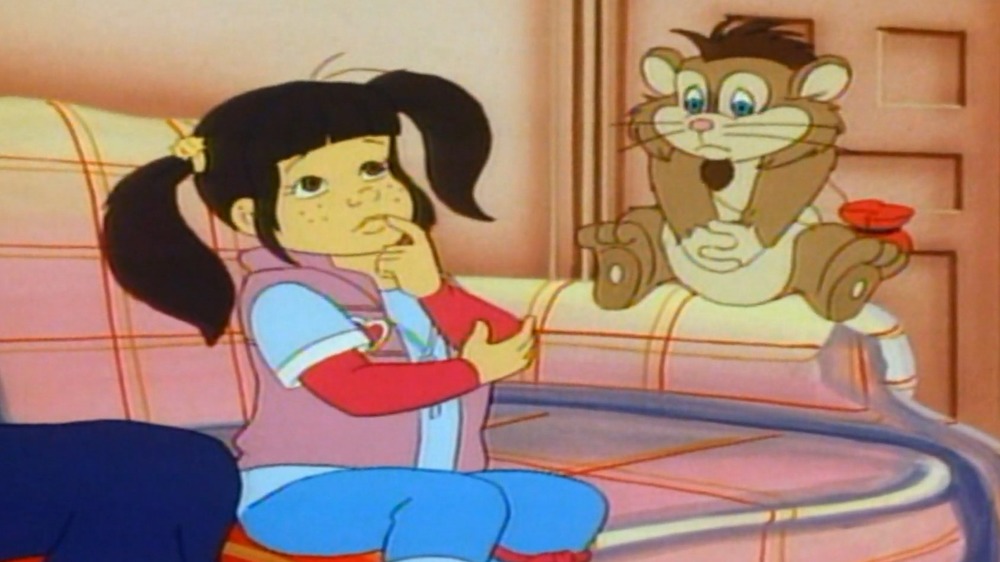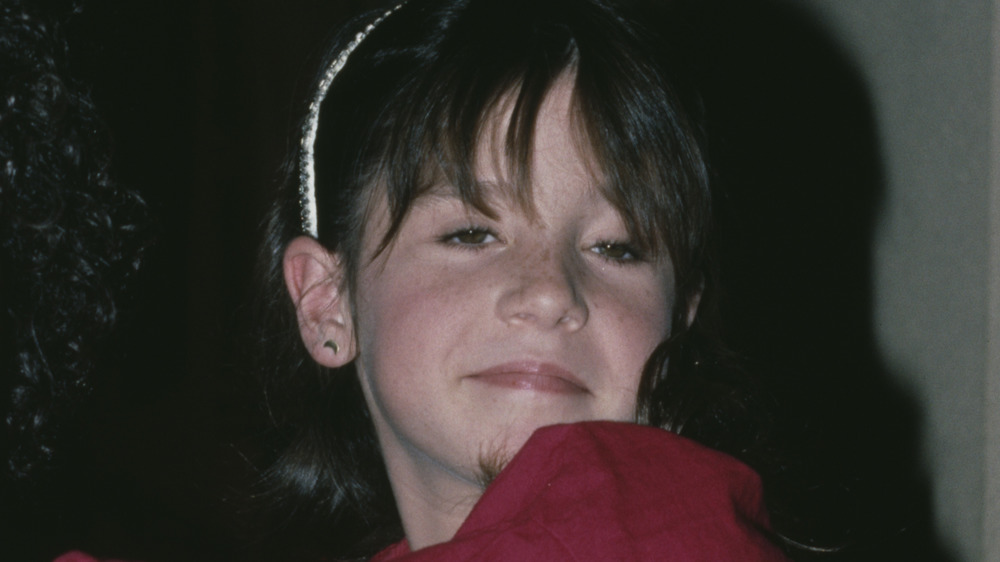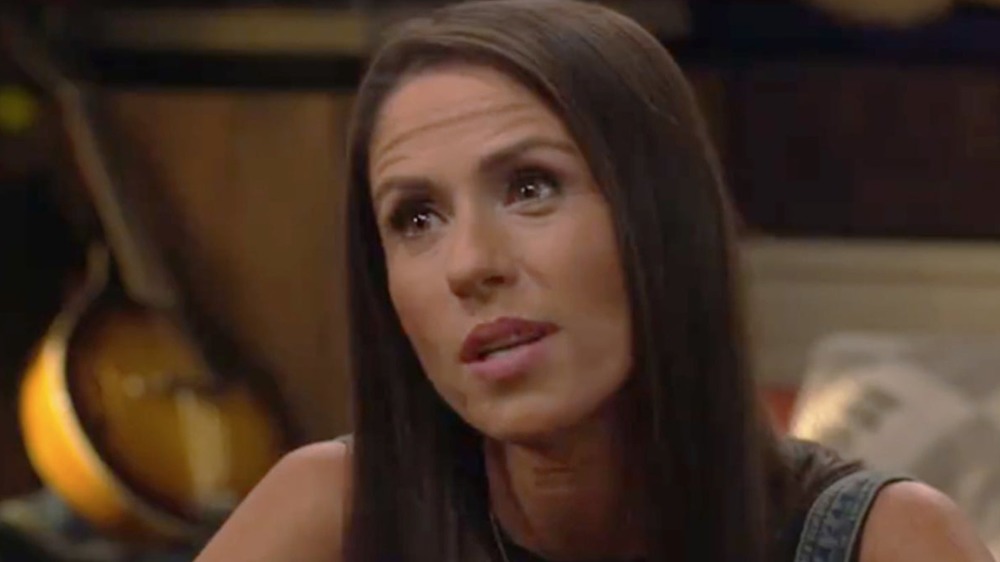The Untold Truth Of Punky Brewster
Punky Brewster was one of the premier kid entertainments of the 1980s. But for all its effervescent charm, it wasn't actually the most light and innocent show on TV — especially when it comes to the protagonist's origins. The NBC sitcom starred child actor Soleil Moon Frye as Penelope Brewster, better known as Punky, an elementary-school-age child left to live on her own after her mother abandons her at a shopping mall. She's discovered squatting in an apartment by a photographer named Henry (played by George Gaynes), who takes her in and becomes decreasingly curmudgeonly, thanks to Punky's relentless and undeniable optimism. With the help of her BFF Cherie, her dog Brandon, and a little "Punky Power," the charismatic kid rises to every challenge she meets, thus navigating the joys and pitfalls of growing up.
Remembered fondly by older Millennials and younger Generation Xers — many of whom adopted Punky Brewster's unique fashion sense, which involves a bright color palette and mismatched shoes – Punky Brewster ranks as one of the all-time great kids' shows. Yet there's a lot to the series that even the most diehard fans might not know about. Here's a look back on the little-known details of peppy '80s favorite Punky Brewster.
How Soleil Moon Frye became Punky Brewster
Soleil Moon Frye had appeared in a couple of made-for-TV movies and a handful of television episodes when she landed the role of plucky Punky Brewster. Despite being a relative newcomer to show business at all of eight years old when the show debuted in 1984, Frye did boast some meaningful connections to Punky Brewster's creator. Her older half-brother Meeno Peluce was a successful child actor, appearing on the TV version of The Bad News Bears, Voyagers!, and as abused child Toby on a "very special episode" of Silver Spoons. That sitcom was developed by David W. Duclon, the creator of Punky Brewster.
Despite this helpful link to the show's source, Frye still had to endure a very competitive audition process. Producers put out a casting call far and wide, and only decided that Frye was the right actor for the part after considering around 3,000 other candidates. Among those Frye defeated was Melissa Joan Hart, who'd later star as the similarly quirky Sabrina on Sabrina the Teenage Witch. Funnily enough, Frye ended up on that show as well, playing Sabrina's friend Roxie King.
When Punky Brewster met Herman Munster
The deep and deliberately voiced George Gaynes had been a hard-working character actor since the early 1960s. He'd landed small parts on dozens of episodes of TV shows including Hogan's Heroes, Columbo, and Quincy, M.E., but he didn't really explode into the public consciousness until 1984, thanks to back-to-back breakout roles as Commandant Eric Lassard in Police Academy and as reluctant adoptive parent Henry Warnimont on Punky Brewster.
However, Gaynes wasn't immediately in contention to land that sitcom dad role. Seasoned television actor Fred Gwynne was gunning for the part as well, which would've marked his third successful sitcom following Car 54, Where are You?, and The Munsters, on which he starred as the Frankenstein's Monster-inspired goofball Herman Munster. Gwynne was eager to be associated with a role besides that of a monster from a 20-year-old novelty sitcom: He attended his Punky Brewster audition dressed in a white suit with a fresh haircut, hoping to look as little like Herman Munster as possible. But then Soleil Moon Frye arrived to read lines with Gwynne and innocently asked, "Aren't you Herman Munster?" Gwynne was so disappointed, he botched his audition.
There's a real Punky Brewster
"Punky Brewster" ranks as one of the most memorable names in TV history. It fits the character tremendously, what with her free-thinking wardrobe choices and attitude, to the point that one would think that TV writers made it up after solidifying Punky's character traits. But in fact, it's actually taken from real life.
NBC Entertainment president Brandon Tartikoff commissioned the show Punky Brewster, suggesting the concept to creator David W. Duclon with the caveat that the main character be named Punky Brewster. As a child, Tartikoff attended Lawrenceville School, an exclusive, boys-only academy where he met the daughter of a teacher whose name was, adorably, Punky Brewster. "It was no crush," Tartikoff clarified to TV Guide. "She was no girlfriend." Punky was actually a nickname — the young woman's real first name was Peyton. When Punky Brewster was in production in 1984, Tartikoff had NBC's lawyers find the real Punky, now married and going by Peyton Rutledge, to get her approval and pay her for the right to use her name. She gave it, and also agreed to film a cameo.
Punky Brewster vs. 60 Minutes
Shows like Punky Brewster — squeaky-clean sitcoms aimed at an audience of children and tweens — no longer air on the big four networks during primetime slots. They thrive on cable outlets that specialize in such fare instead, like the Disney Channel and Nickelodeon. The TV climate was a lot different in the mid-1980s, when the Federal Communications Commission dictated that the broadcast networks use the first hour of primetime television on Sunday nights — 7 PM to 8 PM on the coasts — for news, public affairs, or family-oriented programming.
CBS had placed 60 Minutes, a perennial ratings juggernaut, in that spot since 1975. "It's been proved that other news shows can't succeed against 60 Minutes," NBC Entertainment president Brandon Tartikoff told TV Guide in 1986. Indeed, during the 1983-84 season, NBC tried to compete against 60 Minutes with a newsmagazine called First Camera, which flopped. So, the network opted to counter-program, following the other part of the FCC's dictum and using the early Sunday time slot for kid stuff. Tartikoff placed family comedy Silver Spoons in the Sundays-at-7 spot, and asked the show's producer, David W. Duclon, for a new series to follow at 7:30 PM. This led Duclon to create Punky Brewster.
Punky Brewster, miniaturized
In the mid-1980s, NBC was enjoying a long-running and very lucrative deal that allowed them to run NFL games on Sunday afternoons. Sometimes those football games ran long, exceeding the allocated time slot and thus intruding upon the network's prescheduled primetime television block. NBC wasn't going to cut away from a hotly contested football game in favor of whatever sitcom or scripted drama was supposed to start at 7 PM, so whatever show had that slot was bound to experience some interference during the fall and winter months. NBC anticipated this fate befalling Punky Brewster, set to debut in September 1984.
To help ensure that Punky Brewster would find a foothold with young viewers and not be gobbled up by football, NBC announced a unique format tweak for the show before it even debuted. Of the initial 13 episodes of Punky Brewster ordered, three would be "collapsible," meaning they could be broken down into two standalone, 15-minute episodes. That way, if football ran long, NBC could still air an episode of Punky Brewster that millions of kids had made an appointment to watch, and also ensure its 8 PM hit Knight Rider could start on time. 15-minute shows hadn't been part of the nighttime TV landscape since the 1960s, when the networks produced 15-minute primetime newscasts, but Punky Brewster brought the format back.
The role Cherie Johnson was born to play
Punky Brewster's biggest supporter and constant partner in mischief is her close friend Cherie Johnson, who lives in the same building as Punky's foster father, Henry. The character of Cherie Johnson was played by a young actor also named Cherie Johnson — and that wasn't a coincidence. Punky Brewster was conceived by veteran TV writer David W. Duclon, who happens to be Johnson's uncle. "He created the show, but not for me to have a job," Johnson told Mental Floss. "He just thought he'd use my name and that I'd be thrilled."
Duclon was only vaguely aware that his niece had acting aspirations, of which she wasn't quite convinced herself. On the set of Duclon's other '80s show, Silver Spoons, Johnson told Parlé that she watched Ricky Schroder perform and told Duclon that she could do the same, but "didn't give it a thought of being my career." When Punky Brewster entered production and Johnson learned that Duclon had named a character after her, Johnson pushed to play the role. "He said he needed a real actress," Johnson recalled, but after she auditioned seven times, NBC told him to cast her.
Punky Brewster's dog had a curious namesake
NBC Entertainment president Brandon Tartikoff asked Silver Spoons producer David W. Duclon to create Punky Brewster, giving him a show and character name from a girl he knew in his childhood. Duclon and the show's writers returned the favor with a blatant homage to their boss within the world of Punky Brewster. The title character's dog, a friendly, loyal, and extremely smart golden retriever, is named Brandon, after Tartikoff. The animal who portrayed Brandon was actually named Sandy, and he appeared in all 88 episodes of Punky Brewster (and no other projects), assisted sometimes by a female double played by a lookalike pooch named Brandy.
Viewers loved Brandon almost as much as they loved Punky Brewster — so much so that the American Humane Association gave the show an award for demonstrating the pleasures of dog ownership to audiences. And it all came full circle — Brandon the dog was so charming that he inspired Brandon Tartikoff to adopt a golden retriever himself during the second season of Punky Brewster.
Punky Brewster helped kids cope with the Challenger disaster
On January 28, 1986, NASA launched the space shuttle Challenger. This was almost a routine occurrence, as this would be the 10th time Challenger had gone into space in three years. But this time was indeed different: High school teacher Christa McAuliffe was one of seven Challenger crew members, set to become the first American civilian to visit space. Because of the historical importance and educational connection, countless classrooms around the country tuned in to watch the Challenger launch live. Tragically, a little over a minute after liftoff, the space shuttle exploded, killing all seven crew members. It's impossible to say how many kids watching the moment on TV were traumatized, but the fact that it became a shocking generational milestone is beyond question.
One of those kids left sad and troubled by the event was a fictional one: TV's Punky Brewster. The character repeatedly affirms her desire to be an astronaut when she grows up, so Punky Brewster creator David W. Duclon wrote an episode in which the character processes the Challenger disaster. According to the Los Angeles Times, Duclon also wanted to help kid viewers manage their feelings, and to not give up on their dreams of being astronauts some day. That encouragement is explicitly delivered to Punky in the episode by special guest star Buzz Aldrin, the second man to walk on the moon.
The darkest Punky Brewster episode was suggested by a kid
Punky Brewster received numerous letters from young viewers who "would talk about what they wanted to see Punky do," producer Rick Hawkins told Mental Floss. This inspired show creator David W. Duclon to have an official contest, in which kids sent in their Punky Brewster ideas in the hopes of sending the one chosen to become an actual episode.
A seven-year-old Punky Brewster fan named Jeremy Reams sent in the winning entry, which suggested Punky should show kids how to use CPR to save a life. Show writers ran with that, concocting the 1986 episode "Cherie Lifesaver," wherein Punky's best friend Cherie (Cherie Johnson) gets trapped in a junked fridge while playing. "That came out of research we had done where we learned an alarming number of kids had suffocated in an old fridge or freezer," Hawkins said. By the '80s, fridges had to be openable from the inside, "but in low economic neighborhoods, the old ones were being tossed out in vacant lots." Cherie nearly dies in that fridge, only for Punky to save her with CPR.
Shooting the episode was harrowing, particularly for the studio audience. "We had rehearsal and then we taped in front of a live audience," Johnson recalled. "Kids were screaming, 'Oh no! Get her out!'"
Punky Brewster spawned some spinoffs
Punky Brewster was popular enough that NBC sought to expand their spunky, fashion-forward foundling's TV empire. In the fall of 1985, a year after Punky Brewster debuted, NBC's Saturday morning lineup welcomed a new cartoon also called Punky Brewster, although it was sometimes referred to as It's Punky Brewster to differentiate it from its live-action counterpart. While the sitcom is about an orphan living with a sometimes-stodgy old man, the animated series is a bizarre, fantastical adventure with the characters of Punky Brewster added in. A cute, magical, gopher-like creature named Glomer, who comes from Chaundoon, a city at the end of the rainbow, gets lost in the real world, where he meets Punky and her friends. This Punky Brewster lasted for two strange, whimsical seasons.
Not as successful a spin-off was Fenster Hall. NBC aired the pilot as an episode of Punky Brewster in March 1985 without ordering a full series. Such a series would've explored the day-to-day happenings of the titular children's shelter, which briefly serves as a temporary home to Punky herself in early episodes of Punky Brewster. Believe it or not, this would have been a comedy.
Punky Brewster left NBC and Soleil Moon Frye was sued
Despite its impact with young viewers, Punky Brewster was not a breakout ratings hit. In the 1984-85 season, it ranked 69th out of 77 shows in terms of viewership, and fell to 76th (of 82 programs) in season two. This was bad news for Punky Brewster fans, and NBC canceled it in 1986. There was good news, however: The network sold it to a television syndicate. Several hundred non-network affiliated TV stations in the U.S. needed programming, and many relied on modestly-budgeted scripted productions sold to them by distributors. Joining the ranks of programs of dubious quality like She's the Sheriff, Small Wonder, and Mama's Family were the third and fourth seasons of Punky Brewster. After a post-NBC hiatus of a year and a half, these seasons aired on independent stations around the country in late 1987 and early 1988.
These 44 episodes nearly didn't get produced at all. In a contract dispute, Punky Brewster star Soleil Moon Frye didn't report for work when it came time to shoot the first episodes for syndicator Columbia Pictures Television (owned by Coca-Cola at the time). The company then threatened Frye, 10 years old at the time, with an $80 million lawsuit if she continued to hold out.
Punky Brewster is coming back
Punky Brewster ended a four-year, 88-episode run in the spring of 1988, with its animated Saturday morning spinoff wrapping up a year earlier. And yet the franchise hasn't remained dormant. In 2014, comics publisher Lion Forge's ROAR imprint added a digital-only Punky Brewster book series to its line of nostalgia-stirring adaptations of '80s titles like Airwolf, Knight Rider, and Saved by the Bell. The comic was a collaboration between Teen Titans writer Joelle Sellner and artist Lesley Vamos. Eventually collected and published as Punky Power, the comic serves as a prequel to the 1980s series, focusing on a homeless Punky Brewster (and her puppy, Brandon) as they wander the city looking for a place to live.
In January 2020, NBCUniversal announced that a new Punky Brewster series was in the works. Set to debut in 2021 on the Peacock streaming service, Soleil Moon Frye returns as the title character, now a single mother of three who is still friends with Cherie and still occasionally wears two mismatched shoes. Heart-warmingly, she befriends a girl in foster care who reminds her of her old self.
